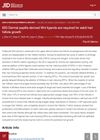Role of Non-Androgenic Factors in Hair Loss and Hair Regrowth
January 2017
in “
International journal of clinical & experimental dermatology
”
oxidative stress micronutrient deficiencies reactive oxygen species Transforming Growth Factor ß1 antioxidants zinc copper selenium vitamins A vitamins C vitamins D nutritional program dietary patterns vegetarian diet lacto-vegetarian diet nutritional correction anti-androgens minoxidil hair follicles ROS TGF-ß1 vitamin A vitamin C vitamin D nutrition diet vegetarian lacto-vegetarian nutrition correction Rogaine

TLDR Eating a balanced diet with vitamins, micronutrients, and antioxidants is important for hair health and can help with hair loss.
The 2017 review article discussed the significance of non-androgenic factors in hair loss and hair regrowth, highlighting the detrimental effects of oxidative stress, micronutrient deficiencies, and environmental and lifestyle factors on hair follicles. It pointed out that reactive oxygen species (ROS) induced by androgens can lead to the release of Transforming Growth Factor (TGF) ß1, which inhibits hair growth, but antioxidants can block this release, suggesting their potential in promoting hair growth. The article also emphasized the importance of micronutrients such as zinc, copper, selenium, and vitamins A, C, and D in maintaining immune function and antioxidant activity, which are essential for hair health. It concluded that a well-planned nutritional program and the use of antioxidants could be effective in strengthening and regrowing hair follicles, potentially reducing the need for medications like Finasteride. The paper also noted that dietary patterns, such as vegetarian and lacto-vegetarian diets, could lead to nutritional deficiencies that contribute to hair loss, and that the nutritional value of foods has declined over the past 50 years. Clinical experience suggested that low dose nutritional correction could improve hair loss management without relying on anti-androgens or minoxidil. The conclusion emphasized the importance of a balanced intake of vitamins, micronutrients, and antioxidants in hair loss management strategies, and suggested that these factors should be considered alongside anti-androgens in treating hair loss.










